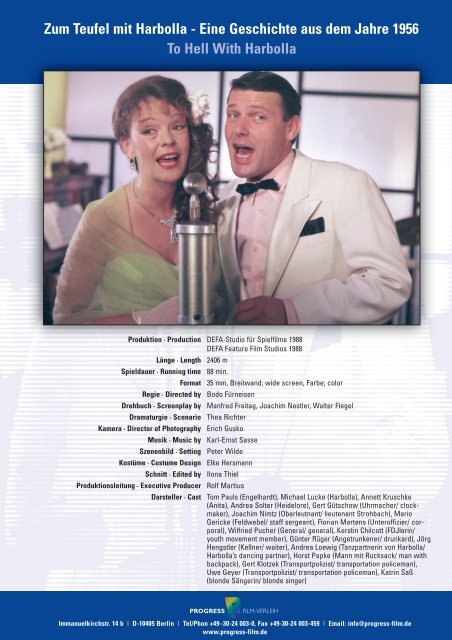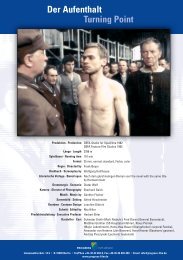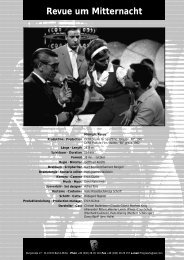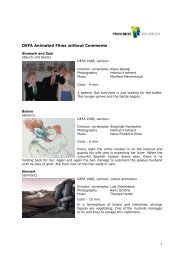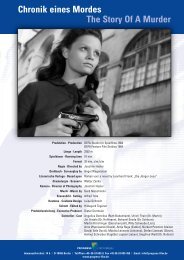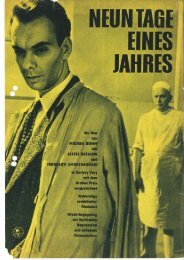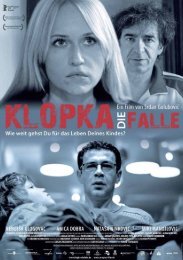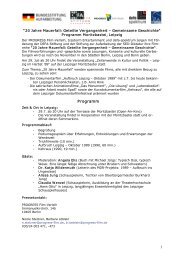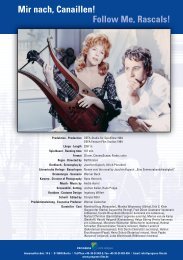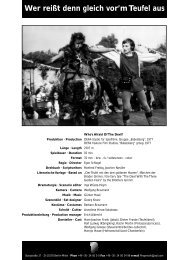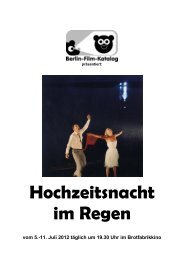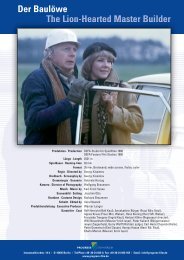DE_FB _2. Serie:* Layout Armin Mueller-Stahl - PROGRESS Film ...
DE_FB _2. Serie:* Layout Armin Mueller-Stahl - PROGRESS Film ...
DE_FB _2. Serie:* Layout Armin Mueller-Stahl - PROGRESS Film ...
Erfolgreiche ePaper selbst erstellen
Machen Sie aus Ihren PDF Publikationen ein blätterbares Flipbook mit unserer einzigartigen Google optimierten e-Paper Software.
Zum Teufel mit Harbolla - Eine Geschichte aus dem Jahre 1956<br />
To Hell With Harbolla<br />
Produktion · Production<br />
Länge · Length<br />
Spieldauer · Running time<br />
Format<br />
Regie · Directed by<br />
Drehbuch · Screenplay by<br />
Dramaturgie · Scenario<br />
Kamera · Director of Photography<br />
Musik · Music by<br />
Szenenbild · Setting<br />
Kostüme · Costume Design<br />
Schnitt · Edited by<br />
Produktionsleitung · Executive Producer<br />
Darsteller · Cast<br />
<strong>DE</strong>FA-Studio für Spielfilme 1988<br />
<strong>DE</strong>FA Feature <strong>Film</strong> Studios 1988<br />
2406 m<br />
88 min.<br />
35 mm, Breitwand; wide screen, Farbe; color<br />
Bodo Fürneisen<br />
Manfred Freitag, Joachim Nestler, Walter Flegel<br />
Thea Richter<br />
Erich Gusko<br />
Karl-Ernst Sasse<br />
Peter Wilde<br />
Elke Hersmann<br />
Ilona Thiel<br />
Rolf Martius<br />
Tom Pauls (Engelhardt), Michael Lucke (Harbolla), Annett Kruschke<br />
(Anita), Andrea Solter (Heidelore), Gert Gütschow (Uhrmacher/ clock -<br />
maker), Joachim Nimtz (Oberleutnant/ lieutenant Strohbach), Mario<br />
Gericke (Feldwebel/ staff sergeant), Florian Martens (Unteroffizier/ corporal),<br />
Wilfried Pucher (General/ general), Kerstin Chilcott (FDJlerin/<br />
youth movement member), Günter Rüger (Angetrunkener/ drunkard), Jörg<br />
Hengstler (Kellner/ waiter), Andrea Loewig (Tanzpartnerin von Harbolla/<br />
Harbolla’s dancing partner), Horst Papke (Mann mit Rucksack/ man with<br />
backpack), Gert Klotzek (Transportpolizist/ transportation policeman),<br />
Uwe Geyer (Transportpolizist/ transportation policeman), Katrin Saß<br />
(blonde Sängerin/ blonde singer)<br />
Immanuelkirchstr. 14 b | D-10405 Berlin | Tel/Phon +49–30-24 003-0, Fax +49-30-24 003-459 | Email: info@progress-film.de<br />
www.progress-film.de
Zum Teufel mit Harbolla - Eine Geschichte aus dem Jahre 1956<br />
To Hell With Harbolla<br />
Gottlieb Engelhardt ist zu gut für die Welt. Eine Welt, in der die DDR<br />
jung ist, der Schwarzmarkt blüht und die Uniformen der Soldaten<br />
ganz neu sind. Und weil Gottlieb trotz Militärakademie ein so liebenswerter<br />
Mensch ist, klebt Schmuggelware an ihm wie ein herrenloser<br />
Hund. Folgerichtig findet eine FDJ-Pionierin heraus, dass<br />
in seiner Uniform ein „neuer Geist weht“. So soll dieser menschenfreundliche<br />
Offizier den fahnenflüchtigen Soldaten Harry Harbolla<br />
aus dem Arrest zurück zur Truppe bringen. Neben vielen unglücklichen<br />
Zufällen dürfen bei dieser turbulenten Persiflage auf den<br />
Hurra-Sozialismus zum Ende der DDR sogar heilige Kühe vorgeführt<br />
werden: Da singt ein übrig gebliebener Nazi Liedgut von Horst Wessel,<br />
ein anarchistisch umgekrempelter NVA-Offizier führt dekadente<br />
Tänzchen auf und die große Liebe entpuppt sich als schlichte Hure.<br />
Ein wenig grotesk ist der Blick auf das eigene Land, dessen Premiere<br />
Ende Februar 1989 stattfand. Mit Harbollas Parole „Mensch<br />
musste bleiben!“ greift Bodo Fürneisen in seinem einzigen <strong>DE</strong>FA-<br />
<strong>Film</strong> eine Grundstimmung auf, die in Verbindung mit der Gesellschaftsparodie<br />
eine sarkastische Komödie ergibt.<br />
Bodo Fürneisen, geb. am 30. Juni 1950 in Berlin; 1973-1977 Regiestudium<br />
an der Deutschen Hochschule für <strong>Film</strong> und Fernsehen in<br />
Potsdam-Babelsberg. 1977-1979 TV-Regieassistent. Ab 1979 Regisseur<br />
und Drehbuchautor v.a. für Fernsehfilme. Nach 1990 überwiegend<br />
Regisseur und Drehbuchautor der öffentlich-rechtlichen Fernsehanstalten<br />
bei verschiedenen <strong>Serie</strong>n wie „Tatort“, „Ein Fall für<br />
Zwei“, „Polizeiruf 110“.<br />
<strong>Film</strong>e (Auswahl): „Die Entdeckung“ (1978); „Abseits“ (1981);<br />
„Geschichte vom goldenen Taler“ (1985); „Zum Teufel mit Harbolla -<br />
Eine Geschichte aus dem Jahre 1956“ (1989); „Scheusal“ (1991)<br />
„Bodo Fürneisen drehte … einen der letzten <strong>Film</strong>e der DDR. … Er zeichnete<br />
… hervorragend ein Sittenbild der damaligen Zeit, gemischt mit<br />
einer originellen Story, etwas Romantik sowie einem gut aufgelegten Darstellerensemble.“<br />
„Der <strong>Film</strong> hat Charme... Und trotz aller Komik gleitet der<br />
<strong>Film</strong> nicht zur Militärklamotte ab.<br />
Hervorragend auch die Musikauswahl mit wenig bekannten, aber gut tanzbaren<br />
Titeln der 50er Jahre. Von Rock'n'Roll-Titel bis Schlager, von Elvis bis<br />
Herbert Roth“<br />
(Thoralf Haß, zelluloid.de, 20.0<strong>2.</strong>2008)<br />
„Fürneisen beweist ernormen Sinn für heitere szenische Details, der Situationswitz,<br />
der Schnitt sind präzise rhythmisiert, Gags entwickeln sich<br />
beiläufig und kommen wie aus dem Handgelenk geschüttelt.“<br />
(Norbert Wehrstedt, <strong>Film</strong> und Fernsehen 7/1989)<br />
„Ein slapstickartig eingesetzter vierbeiniger Freund als Deus ex machina<br />
weiß ebenso zu bezaubern wie das Schlager-Duo Katrin Saß und Walter<br />
Plathe. Gerade weil sie die schwachsinnigen Liedchen aus den fünfziger<br />
Jahren mit der gebotenen Ernsthaftigkeit zelebrieren, gelingt ihnen die<br />
perfekte Parodie.“<br />
(Renate Holland-Moritz, Eulenspiegel, 16/1989)<br />
INHALT · STORYLINE<br />
Gottlieb Engelhardt is too good for this world. A world in which the<br />
GDR is young, the black market is prospering and the soldiers’ uniforms<br />
are brand-new. And because Gottlieb is such a nice person<br />
even though he is attending the military academy, contraband<br />
goods stick to him like an abandoned dog. A FDJ pioneer finds out<br />
that there is a “new spirit blowing” in his uniform. This philanthropic<br />
officer has to bring Harry Harbolla, a deserter, from the arrest back<br />
to the troops. Besides many unfortunate coincidences, this turbulent<br />
persiflage on the Hooray-Socialism towards the end of the GDR<br />
even pokes fun at sacred cows: A leftover Nazi is singing Horst<br />
Wessel songs, an anarchist NVA soldier performs decadent dances<br />
and the big love turns out to be a mere whore.<br />
The view on the own country is a bit absurd; the premier took place<br />
in the end of February of the year of the fall of the Wall. With Harbolla’s<br />
slogan “You need to stay human!” Bodo Fürneisen, in his<br />
only <strong>DE</strong>FA film, reflects the prevailing mood which combined with<br />
social parody results in a sarcastic comedy.<br />
BIOGRAPHIE <strong>DE</strong>S REGISSEURS · DIRECTOR’S BIOGRAPHY<br />
PRESSESTIMMEN · PRESS COMMENTS<br />
Bodo Fürneisen, born in Berlin on June 30th 1950; 1973-77 directing<br />
studies at the German <strong>Film</strong> and Television Academy in Potsdam-<br />
Babelsberg. 1977-79 assistant director for East German television;<br />
since 1979 director and screenwriter, primarily for TV films. After<br />
1990 predominantly director and screenwriter of public television<br />
stations for several series such as “Tatort”, “Ein Fall für Zwei”,<br />
“Polizeiruf 110”.<br />
<strong>Film</strong>s (excerpt): “Die Entdeckung” (1978); “Abseits” (1981);<br />
“Geschichte vom goldenen Taler” (1985); “ To Hell With Harbolla”<br />
(1989); “Scheusal” (1991)<br />
“Bodo Fürneisen made one of the last movies of the GDR … He drew an<br />
excellent picture of those days and its conventions, merging it with an<br />
inventive story, a dash of romance and a good-humoured ensemble cast.”<br />
“The film is charming... Despite all its humour, the film does not slide into<br />
slapstick.<br />
The music selection is also outstanding, including less famous titles from<br />
the 1950s that are great to dance to nonetheless. From Rock’n’Roll to German<br />
beat-music, from Elvis to Herbert Roth”<br />
(Thoralf Haß, zelluloid.de, 20.0<strong>2.</strong>2008)<br />
“Fürneisen proves to have an enormous sense for blithe scenic detail; situation<br />
comedy and editing are precise and rhythmic; and gags develop<br />
casually and seem to be delivered naturally.”<br />
(Norbert Wehrstedt, <strong>Film</strong> und Fernsehen 7/1989)<br />
„A four-legged friend, used like a slapstick element as Deus ex Machina,<br />
is as bewitching as the duo of German beat-music singers Katrin Saß and<br />
Walter Plathe. It’s exactly because they celebrate the ludicrous songs from<br />
the 1950s with such a serious demeanour that they master the art of perfect<br />
parody.”<br />
(Renate Holland-Moritz, Eulenspiegel, 16/1989)


